Archive Entries for May 2019
« April 2019 | Main | June 2019 »
Friday May 31, 2019
Books in May
-
After the Party by Cressida Connolly
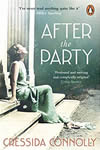
I was fascinated by this book. It provided a particularly interesting read for me, covering many aspects of social history which have long appealed.
Firstly, it was an excellent story about a "real" (not real) person, Phyllis. Told from her point of view I completely empathised with her and, although I think it's meant to be more ambiguous, I was totally convinced that she was simply naive. Somehow the writing drove the story beyond the usual themes of her "not realising" what was happening in 1930s England; as part of a lower middle class social stratum - which she was thrust into having returned from a life abroad - she really did not realise what was happening. Only vaguely interested in politics, (if at all), she just went with the social norms within her "set", where she and her husband were keen to fit in.
Secondly it is set in and around Sussex, with a lot of historical detail about fascism and fascist groups there, including the British Union seaside camps (no mention of "National" or "Fascists" any more), and the defacing of the Jewish-owned theatre at Worthing with anti semitic graffiti ("just high spirits"). I felt I should know about all this - yet I did not.
Thirdly, the imprisonment of fascists at the outbreak of war, and subsequent internment on the Isle of Mann - along with other categories segregated internees - was really an unknown (or at least unexplored) piece of history for me. The effect on the local inhabitants for the duration was really pretty terrible.
Finally, I liked the way the story was told, supposedly written by a third party based on interviews with Phyllis, as an old woman in the 1970s. It interleaves two timelines: 1938, told as a story in the third person; and the 1979, interviews written in the first person. In 1938, you can be sympathetic to Phyllis, and see the gradual slide into an extremist organisation without questioning its values; in fact, although the "Party" of the title is meant to indicate a watershed moment which "changed her life forever", I did not really find that to be the case - it was just one more step on the slippery slope. However, it is clear from the 1970s, Phyllis that she is, or turned out to be, an altogether more unpleasant person.
I would recommend two other reviews: Café Society, and A Manor of Reading. -
Tangerine by Christine Mangan
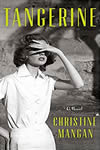
It's 1956, Alice lives in Tangier with her husband John. Lucy, a once inseparable friend, but now estranged, arrives without warning, expecting to carry on the friendship where it left off over a year ago. This all seems to work out fairly well, but after an initial new sense of freedom, Alice begins to experience the familiar feeling of being controlled and stifled by Lucy - and then John goes missing....
This is a rather creepy psychological thriller to quote Joyce Carol Oates: "As if Donna Tartt, Gillian Flynn, and Patricia Highsmith had collaborated in a screenplay to be filmed by Hitchcock". I can see a strong connection with Patricia Highsmith, of whom I have to confess I am not overly fond, although that did not appear to affect my enjoyment of this book. The setting in the 1950s enhances that Highsmith feeling, and the progress of the story is not unlike that of Mr Ripley if that's not too much of a spoiler. However, I am astonished that it's a debut novel as it's highly polished and convincingly evocative of time and place. - Eleanor Oliphant is Completely Fine by Gail Honeyman
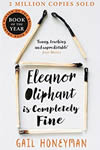
My sister lent me this book which I had heard of as an award winning debut novel. It's the type of novel that appeals to me (like a Christmas Carol et al) as in a way it is a tale of redemption - where the protagonist is redeemed rather than redeeming herself... I'm aware that this is a bit arrogant in that Eleanor definitely does not think she needs saving from anything, (she is fine), so I am seeing her from my point of view and from what I feel is normality. However, I think we believe she herself feels a kind of happiness at the end of the book that she was not experiencing previously.
Eleanor is shifted out of her settled existence by a small act of kindness that she shows to another, and from there on we find small acts of kindness abound, and Eleanor finds she has friends that she never knew she needed. The book exudes a "gentle warmth", as the Guardian reviewer puts it, as well as being really humorous and a joy to read. [And yes it did remind me of Judith Hearne but for those for whom that might be worrying, it has a somewhat more uplifting ending]. - A Price to Pay by Chris Simms [read by Becky Hindley]
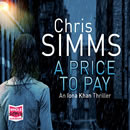
The first book about DC Iona Khan - which I have not yet read (listened to) was part of the Guardian round-up of crime fiction in 2012. This is the second book, but works well as a stand alone story.
It starts with the strange death of a teenage runaway, who apparently killed herself leaping from a motorway bridge into the speeding traffic below. The girl's identity is unknown, but Iona links her profile to three others of recently missing girls. In addition, the CCTV footage - such as it is - provides some interesting clues about a possible second person with her on the bridge as she jumped. Even more creepy is that Iona herself has a close resemblance to the dead girl, and soon becomes a target for the sinister gang involved in the disappearances. Hold tight for a thoroughly thrilling read... -
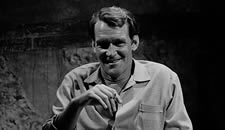 Stand By For West: Battle for Inspector West
Stand By For West: Battle for Inspector West
I was fascinated to see this available on iPlayer, with it's star Patrick Allen who was a very prolific actor in my youth - the last thing I noticed him playing was Colonel Sebastian Moran in the Jeremy Brett Sherlock Holmes series from 1986, though it seems he was pretty active long after that, (often as an "announcer" as he has a stereotypical "true Brit" (or more precisely English..) voice. Anyway it seems there were quite a few of these multi-episode radio series of which this was the first.
John Creasey created Chief Inspector Roger West, and he featured in more than forty novels between 1942 and 1973 - the basis for this series Battle for Inspector West was published in 1948. Apparently six of the novels were adapted for radio by Maurice Travers.
First aired in 1967, stars Patrick Allen, Sarah Lawson, Humphrey Morton, Philip Bond, Denise Buckley, Hamilton Dyce, John Cazabon, Eva Stuart, Francis de Wolff, Trevor Bannister, and Preston Lockwood; produced by John Fawcett Wilson. -
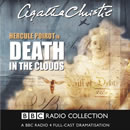 Death in the Clouds
Death in the Clouds
First published in 1935 - I remember a very old copy in a red cloth binding that I read as a teenager, (well-read and dust jacket missing). However, this is one of the BBC radio plays from 2003 with John Moffat as Poirot - never liked his interpretation (or more precisely accent) but he seems to have done them all - and Philip Jackson - who by contrast seems to be the perfect Japp.
On a flight from Le Bourget to Croydon, (I'm loving it already), a woman is found dead. It's intended to look like a wasp-sting was responsible, but Poirot (co-incidentally on board) is not taken in.
Dramatised in 2003 by Michael Bakewell, and directed by Enyd Williams, also starring, Geoffrey Whitehead, Murray Melvin, Teresa Gallagher, Carolyn Jones, Ben Crowe, Andrew Harrison, Bruce Purchase, Liza Sadovy, Priyanga Elan, and Steven Critchlow.
Posted on May 31, 2019 at 4:36 PM. Category: Books of the Month.
